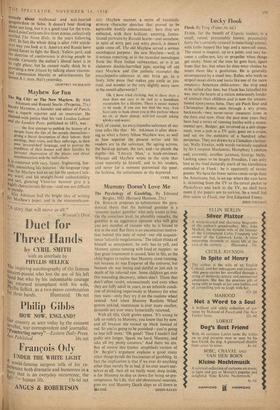Mummy Doesn't Love Me The Psychology of Gambling. By Edmund
Bergler. MD. (Bernard Hanison. 25s.) Da. BERGLER proposes to substantiate the para- doxical thesis that the habitual gambler is a 'neurotic sucker gambler' who only wants to lose. On the conscious level, he plauSibly remarks, the gambler is an aggressive optimist who will give you any number of reasons why he is bound to win in the end. But there is an unconscious motiva- tion behind this state of mind—our old acquain- tance 'infantile megalomania.' The infant thinks of himself as omnipotent; he only has to yell, and Mummy conies running with food or nappies: so that great resentment is caused, later in life, as the child begins to realise that Mummy came running, not because he was Emperor of the universe, but because she was loving and dutiful or just sick to death of his infernal row. Some children get over this wounding discovery, others don't. Those that don't' often revert, unconsciously and even when they are fully adult in years, to an infantile condi- tion of shrieking imperiously at Mummy for what they want--only they try it on the roulette wheel instead. And when Mummy 'Roulette Wheel proves unkind, resentment is ever more swollen, demands are ever more hysterically renewed.
With all this, Guilt grows apace. 'It's wrong to talk so rudely to Mummy, you know that by now, and all because she turned up black instead of red. So you're going to be punished—you're going to lose still more.' Oh good! Then I needn't feel guilty any longer. Spank me hard,' Mummy, and take all my pretty counters.' And there we are. But of course this (rather simplified) version of Dr. Bergler's argument explains a good many other things beside the fascination of gambling. In fact the implication is that if we ever do anything other than merely lie in bed, if we ever assert our- selves at all, then all we really want, deep inside, is for Mummy to slap us down for being so pre- sumptuous. So Life, that old obsessional neurosis, goes on, and Mummy Death slaps us all down in






































 Previous page
Previous page